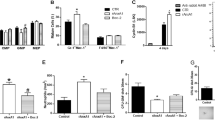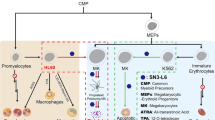Abstract
Amifostine (WR-2721, Ethyol) is a phosphorylated aminothiol that affords broad cytoprotection from the myelosuppressive effects of antineoplastics. To further characterize its hematopoietic activities, we investigated the effects of amifostine and its dephosphorylated metabolite, WR1065, on the in vitro growth of human bone marrow progenitors. Preincubation exposure to amifostine or WR1065 stimulated the growth of colony-forming units granulocyte, erythroid, macrophage, megakaryocyte (CFU-GEMM) and erythroid bursts (BFU-E) from bone marrow mononuclear cells in a dose-dependent fashion. Over the concentration range tested (0.1–1000 μM), pretreatment with the aminothiols enhanced formation of CFU-GEMM up to five-fold and BFU-E nine-fold, compared to a three-fold increase in myeloid colony recovery. In CD34+ selected cells, preincubation with amifostine increased formation of CFU-GEMM up to 38-fold and produced macroscopic colonies, exceeding colony number in cultures initiated with optimal concentrations of interleukin-1 (IL-1), IL-3, or kit ligand (KL). When compared with recombinant human cytokines, amifostine enhanced IL-1 and IL-3 induced colony formation, although its stimulatory effect was less than additive. In contrast, pretreatment with amifostine antagonized the stimulatory effects of KL, whereas synergy was observed with concurrent exposure. Ex vivo expansion studies showed that amifostine alone supported and augmented the production of myeloid progenitors in secondary cultures. Similarly, under cytokine-deficient conditions, amifostine promoted cell survival and delayed apoptosis as measured by nucleosome generation. These data indicate that amifostine is a novel multipotent hematopoietic stimulant that augments the formation and survival of bone marrow progenitors.
This is a preview of subscription content, access via your institution
Access options
Subscribe to this journal
Receive 12 print issues and online access
$259.00 per year
only $21.58 per issue
Buy this article
- Purchase on Springer Link
- Instant access to full article PDF
Prices may be subject to local taxes which are calculated during checkout
Similar content being viewed by others
Author information
Authors and Affiliations
Rights and permissions
About this article
Cite this article
List, A., Heaton, R., Glinsmann-Gibson, B. et al. Amifostine stimulates formation of multipotent and erythroid bone marrow progenitors. Leukemia 12, 1596–1602 (1998). https://doi.org/10.1038/sj.leu.2401151
Received:
Accepted:
Published:
Issue Date:
DOI: https://doi.org/10.1038/sj.leu.2401151
Keywords
This article is cited by
-
Amifostine prior to lethal irradiation prevents allogeneic bone marrow engraftment in mice
Bone Marrow Transplantation (2008)
-
p53 protein regulates the effects of amifostine on apoptosis, cell cycle progression, and cytoprotection
British Journal of Cancer (2003)
-
Pathogenesis, classification, and treatment of myelodysplastic syndromes (MDS)
Wiener Klinische Wochenschrift (2003)
-
Amifostine plus erythropoietin in a patient with low-risk myelodysplastic syndrome
Annals of Hematology (2003)
-
Oxidative Stress and the Myelodysplastic Syndromes
International Journal of Hematology (2003)



